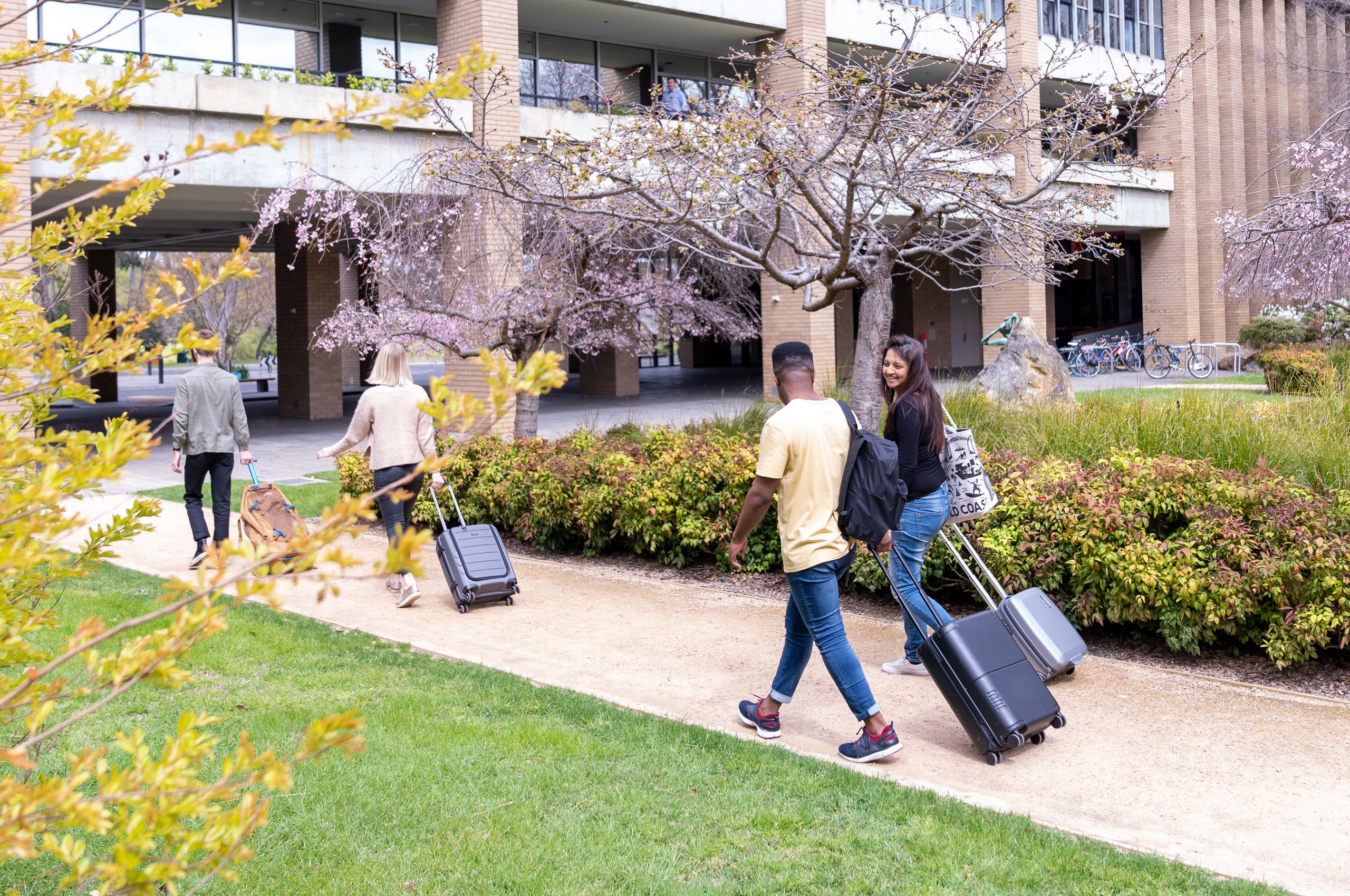Preparing to arrive

As the start of your La Trobe study journey comes closer, make sure you are prepped before you travel to Australia.
Online Pre-departure sessions
Join our live, online Pre-Departure Session to support your transition from leaving home to on-campus study. You'll learn helpful tips and essential information from our support services and current students to help you prepare for studying and living in Australia.
Session details
- Date: 23 October 2024
- Time: 3.30 pm-5.00 pm AEDT (Melbourne time)
Prepare for your journey to Australia
Information regarding the requirements to enter Australia is found on the Department of Home Affairs TravelSECURE webpage. TravelSECURE provides a range of tips and advice to help you prepare for your journey to Australia. It is your responsibility to read and follow the requirements of the Australian Government.
You will need to have a valid and active student visa to enter Australia. If you do not have a student visa, you will need to apply for one before travelling to Australia.
Cost of living
When preparing to come to Australia, remember that course fees are just one part of your costs.
You’ll also need to budget for living expenses, which can vary based on where you live and your lifestyle. For example, Bendigo may be more affordable than Melbourne, and shared housing is generally cheaper than private accommodation.
Your expenses will also depend on how often you eat out, your phone and internet plans, and whether you use public transport or drive.
Learn what to include in your cost of living calculations and use this cost of living calculator to estimate your expenses.
Living in Australia webinar
Our comprehensive Living in Australia webinar offers you support and advice on everything you need to know before leaving your home to transition to Australia.
Nó bao gồm thông tin có giá trị liên quan đến chỗ ở, giao thông, thực phẩm, làm việc, dịch vụ y tế và giữ an toàn.
Prepare for your first semester with our Orientation events. You can create a personalised orientation plan using our Orientation Planner.
Be sure to register for the below essential sessions on the Orientation Planner, which are available in various formats:
- International Pre-departure webinar (on-demand recording)
- International Student Essentials webinar (on-demand recording)
- Course Essentials (on-demand recording)
- International Students Meet and Greet events (on campus)
We have a variety of comfortable and accessible residences to choose from at all our campuses. Living on campus is the ideal way to experience university life and make lifelong friends.
If you need somewhere to stay after you've arrived in Australia, while you wait to find or move into long-term housing, you can check out some off-campus temporary accommodation options below.
We also have some guides to help you with cost of living planning and knowing your rights when living off campus.
The currency of Australia is the Australian dollar. It’s listed using the $ symbol and you may also see it noted as A$, AU$ or AUD.
Bank accounts
Australia has range of banks you can open a bank account with before you leave home.
We recommend you open an Australian bank account, as it is safer than carrying around large amounts of cash. You can withdraw funds on arrival using your passport.
Before transferring funds, you need to be certain that you’re coming to Australia, because you can only access your transferred funds once you’ve arrived and have provided identification.
Student banking
Certain banks will offer student accounts with lower account-keeping fees or exempt students from fees entirely.
Your chosen bank should be able to discuss the options available to you, along with what documentation you may need.
We've listed the range of transport options available for getting you from the airport to your campus in our helpful Airport Transport flyer.
Australian quarantine laws
Australia has strict quarantine laws in place to help prevent the spread of pests and diseases. Many items are not allowed to be imported into Australia, including:
- live plants
- live animals
- dairy
- eggs.
You need to declare if you’re bringing such items with you. You can do this using the incoming passenger card given to you before you disembark your flight, which is then used in the customs process.
Declaring an item means it will be inspected by a quarantine officer and returned to you if it passes inspection. The item may need to be treated before it’s returned to you. Not declaring items of quarantine concern may lead to on-the-spot fines or even prosecution, if they are identified by an officer.
For further information on what you can take with you, visit the Department of Home Affairs website.
Duty-free and customs restrictions
You can bring goods into Australia duty free in your accompanied baggage to the value of A$900 if you're aged 18 years or over and A$450 if you are under 18 years of age.
If you have anything with you in excess of the duty-free goods allowance, declare the goods and provide proof of purchase to Customs. They will calculate any duty and tax to be paid.
For details on what items can be brought in through customs free of duty, visit the Australian Border Force website.